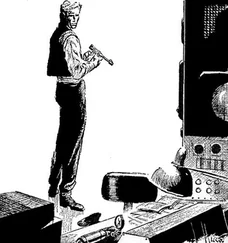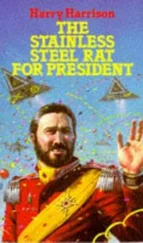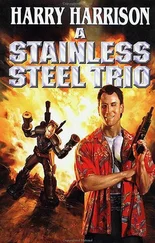Harry Harrison - The Turing Option
Здесь есть возможность читать онлайн «Harry Harrison - The Turing Option» весь текст электронной книги совершенно бесплатно (целиком полную версию без сокращений). В некоторых случаях можно слушать аудио, скачать через торрент в формате fb2 и присутствует краткое содержание. Год выпуска: 1992, ISBN: 1992, Издательство: Viking, Жанр: Фантастика и фэнтези, на английском языке. Описание произведения, (предисловие) а так же отзывы посетителей доступны на портале библиотеки ЛибКат.
- Название:The Turing Option
- Автор:
- Издательство:Viking
- Жанр:
- Год:1992
- ISBN:978-0-670-84528-6
- Рейтинг книги:3 / 5. Голосов: 1
-
Избранное:Добавить в избранное
- Отзывы:
-
Ваша оценка:
- 60
- 1
- 2
- 3
- 4
- 5
The Turing Option: краткое содержание, описание и аннотация
Предлагаем к чтению аннотацию, описание, краткое содержание или предисловие (зависит от того, что написал сам автор книги «The Turing Option»). Если вы не нашли необходимую информацию о книге — напишите в комментариях, мы постараемся отыскать её.
The Turing Option — читать онлайн бесплатно полную книгу (весь текст) целиком
Ниже представлен текст книги, разбитый по страницам. Система сохранения места последней прочитанной страницы, позволяет с удобством читать онлайн бесплатно книгу «The Turing Option», без необходимости каждый раз заново искать на чём Вы остановились. Поставьте закладку, и сможете в любой момент перейти на страницу, на которой закончили чтение.
Интервал:
Закладка:
“Kim, I want you to take a look at your screen right now,” Dr. Betser said. “You had trouble with this last week and until you know exactly what is happening you won’t be able to move on to the next step. Now look at this.”
The instructor had typed the equations into his own computer — which not only displayed them on the screen in front of the class but entered them into the desk computers of all the students at the same moment.
“Show us how to do it,” he said and switched command to her. All eyes were on the screen as Kim reluctantly touched her keyboard.
All eyes except Brian’s. He had worked out the solution within a minute after the problem had been entered. College was becoming as frustrating as high school had been. He spent almost all of his class time waiting for the others to catch up with him. They were a stupid and despicable lot who looked down on him like some kind of freak. All of them were four, five years older than he was — while most of them stood a head taller. At times he felt like a midget. And it wasn’t just paranoia on his part — they really did hate him, he was sure of it. Disliked him because he was younger, out of place here. Plenty of jealousy too, since he did the work so much better and faster than they did. How had people who really knew how to think, like Turing or Einstein or Feynman, how had they managed to live through school?
He looked at his screen and tried not to groan as the girl made a hash of it. It was too awful to watch. He casually pushed his pocket calculator against the side of his terminal and punched in a quick code. A list of Italian verbs appeared in a window on the screen and he scrolled through them, memorizing the new ones.
Brian had discovered, very early on, that the school tapped into every student’s computer and recorded all the data that was entered into it. This was made obvious by some of the questions they had asked him, knowledge they could only have obtained in this underhand way. Once he had discovered it, he made sure that the school computer was just used for schoolwork. He had observed that his teachers, Dr. Betser in particular, were quite certain that their words were golden — and would be quite upset if they discovered that during their lectures he had been running war games or accessing data bases instead of giving them a hundred percent attention. But there were ways around everything. If all of the computers in the schoolroom had been connected by cables it might have been easier — or harder to misdirect information. But now narrow-band infrared links, like ethernet systems, filled the room with invisible communication. Every computer had a digitally tunable LED, a light-emitting diode, that transmitted on low-noise channels. A photodetector picked up messages it was tuned to. Brian’s solution to this was to build an intercepting device into what appeared to be a pocket calculator. When it was placed at the side of his computer it intercepted the incoming signal and rebroadcast it. So he could do whatever he wished without anyone being able to detect the operation. What was on the screen was for his eyes alone! Allattare to feed or to nurse… allenare to exercise, to train.
He was still keeping track of the class and became vaguely aware that Dr. Betser’s voice was taking on that weary, nagging tone.
“… a basic misunderstanding of how we make successive approximations. Unless you get this basic point, you’ll never get any further. Brian — will you do this correctly so we can move on. And, Kim, I want to see you after class.”
The Italian verbs vanished as Brian pushed the calculator aside. He looked at the screen and tracked her first error. “The misconception begins here,” he said, moving the cursor and highlighting the equation. “After you find the first-order solution, you have to remove it — subtract it from the original equation — before you can apply the same method to find the next term. If you forget to do that, you’ll keep getting the same term again. And then you have to divide out the independent variable, or you will just get zero the next time. And finally, you have to go backward again, adding the terms back in and multiplying back the variable again. I think the trouble is that everyone in the class believes that there are a lot of different ideas here, derivatives, approximations, second-order approximations, and so on. But there’s only one idea, used over and over. I don’t see why they make it out to be so complicated…”
An hour later Brian was eating his cheese and tomato sandwich and reading Galaxy Warhounds of Procyon when someone sat down heavily on the bench beside him. This was unusual enough since he was left strictly alone by the other students. More unusual were the tanned fingers that pulled the book from him and slammed it onto the table.
“Juvenile science fiction space crap that only kids read,” Kim snapped at him.
He had had this argument often enough before. “Science fiction utilizes a vocabulary twice as large as that of all other popular fiction. While SF readers are in the top percentile…”
“Space balls! You made me look pretty dumb today.”
“Well you were pretty dumb! I’m sorry.”
Brian’s worried expression got to her; she could never stay angry very long in any case. She laughed aloud and pushed his book back to him. Pushing it through a slice of tomato on the table. He smiled and wiped the cover with his napkin.
“In fact it wasn’t even your fault anyway,” he said. “Old Betser may be a wizard programming mathematician but he doesn’t know a gnat’s fart about explaining it to anyone.”
“What do you mean?” She was interested now, reached out and broke off a corner of his sandwich. He noticed that her teeth were very white and neat, her lips red — and that was without lipstick. He pushed the remains of the sandwich over to her.
“He’s always going off on tangents, getting sidetracked into explanations that have nothing to do with the material he should be teaching, things like that. I always stay a chapter ahead of him in the text so he won’t confuse me when he starts to explain something.”
“Amazing!” Kim said, meaning the thought of reading a text you didn’t have to when there were so many other wonderful things to do. “Can you do better than him, Mr. Smartass?”
“Run circles around him, Miss Birdbrain. Using the heretofore totally secret Brian Delaney lightning instruction system all will be made clear! In the first place, it’s not really so important to know exactly how to solve each problem.”
“That sounds stupid. How can you solve a problem if you don’t know how to solve it?”
“By doing just the opposite. You can learn a lot of ways not to solve it. A lot of wrong methods not to try. Then, once you find the most common mistakes, you can hardly help doing the right thing without even trying.”
He remembered exactly where she had gone wrong and knew at once what her misunderstanding was. He explained it patiently, two or three ways, until she finally caught on.
“Is that what my trouble was! Why didn’t Beastly Betser explain it like that? It’s obvious.”
“Everything is obvious once you understand it. Why don’t you work through the rest of those examples while this is clear in your head?”
“Maybe tomorrow. Got things to do, gotta run.”
Run she did, or at least trotted out of the dining room, and he shook his head as he watched her go. Girls! They were a strange breed. He opened his book and winced at the red tomato stains. Sloppy. Sloppy thinking too, she should have worked this thing out while it was fresh in her head. Five will get you ten she would forget the whole thing by tomorrow.
She did. “You were right! It was gone, zip. I thought I remembered, but not exactly.”
Читать дальшеИнтервал:
Закладка:
Похожие книги на «The Turing Option»
Представляем Вашему вниманию похожие книги на «The Turing Option» списком для выбора. Мы отобрали схожую по названию и смыслу литературу в надежде предоставить читателям больше вариантов отыскать новые, интересные, ещё непрочитанные произведения.
Обсуждение, отзывы о книге «The Turing Option» и просто собственные мнения читателей. Оставьте ваши комментарии, напишите, что Вы думаете о произведении, его смысле или главных героях. Укажите что конкретно понравилось, а что нет, и почему Вы так считаете.










